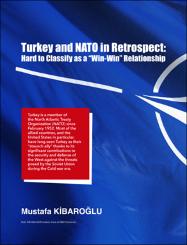Please use this identifier to cite or link to this item:
https://hdl.handle.net/20.500.11779/461Full metadata record
| DC Field | Value | Language |
|---|---|---|
| dc.contributor.author | Kibaroğlu, Mustafa | - |
| dc.date.accessioned | 2019-02-22T15:48:43Z | |
| dc.date.available | 2019-02-22T15:48:43Z | |
| dc.date.issued | 2018 | - |
| dc.identifier.citation | Kibaroglu, M. (April-June 2018). Turkey and NATO in Retrospect: Hard to Classify as a “Win-Win” Relationship”, The Strategist. No. 2, pp. 6-13. | en_US |
| dc.identifier.issn | 2587-1005 | - |
| dc.identifier.uri | https://hdl.handle.net/20.500.11779/461 | - |
| dc.identifier.uri | http://eng.stratejistdergisi.com/ | - |
| dc.description.abstract | Turkey is a member of the North Atlantic Treaty Organization (NATO) since February 1952. Most of the allied countries, and the United States in particular, have long seen Turkey as their “staunch ally” thanks to its significant contributions to the security and defense of the West against the threats posed by the Soviet Union during the Cold war era. Yet, there have been tough times as well in this relationship, especially when Turkey and Greece have been at odds with each other over a host of issues, either in Cyprus or in the Aegean that brought the two NATO allies to the brink of hot confrontation. There were also heavy criticisms towards Turkey, time and again, from the leading members of the Alliance, such as the one that surfaced prior to and during the Lisbon Summit in November 2010 where the “Missile Shield” was a key issue on the agenda and Turkey was (wrongly) blamed for obstructing the implementation of the project, which was not the case, at all. | en_US |
| dc.language.iso | en | en_US |
| dc.publisher | BİLGESAM | en_US |
| dc.relation.ispartof | The Strategist | en_US |
| dc.rights | info:eu-repo/semantics/closedAccess | en_US |
| dc.rights.uri | http://creativecommons.org/licenses/by-nc-nd/3.0/us/ | * |
| dc.subject | Turkey | en_US |
| dc.subject | NATO | en_US |
| dc.title | Turkey and Nato in Retrospect: Hard To Classify as a “win-Win” Relationship | en_US |
| dc.type | Article | en_US |
| dc.authorid | Mustafa Kibaroğlu / 10107 | - |
| dc.authorid | Mustafa Kibaroğlu / C-2925-2019 | - |
| dc.authorid | Mustafa Kibaroğlu / 0000-0003-1147-9363 | - |
| dc.relation.publicationcategory | Makale - Uluslararası - Editör Denetimli Dergi | en_US |
| dc.identifier.endpage | 13 | en_US |
| dc.identifier.startpage | 6 | en_US |
| dc.identifier.issue | 2 | en_US |
| dc.department | İİSBF, Siyaset Bilimi ve Uluslararası İlişkiler Bölümü | en_US |
| dc.institutionauthor | Kibaroğlu, Mustafa | - |
| item.grantfulltext | open | - |
| item.fulltext | With Fulltext | - |
| item.languageiso639-1 | en | - |
| item.openairetype | Article | - |
| item.openairecristype | http://purl.org/coar/resource_type/c_18cf | - |
| item.cerifentitytype | Publications | - |
| crisitem.author.dept | 04.04. Department of Political Science and International Relations | - |
| Appears in Collections: | Siyaset Bilimi ve Uluslararası İlişkiler Bölümü Koleksiyonu | |
Files in This Item:
| File | Description | Size | Format | |
|---|---|---|---|---|
| mustafakibaroglu_thestrategist_tr-nato_april-june2018.pdf | Yayıncı Sürümü - Makale | 5.74 MB | Adobe PDF |  View/Open |
CORE Recommender
Page view(s)
40
checked on Nov 18, 2024
Download(s)
6
checked on Nov 18, 2024
Google ScholarTM
Check
This item is licensed under a Creative Commons License
